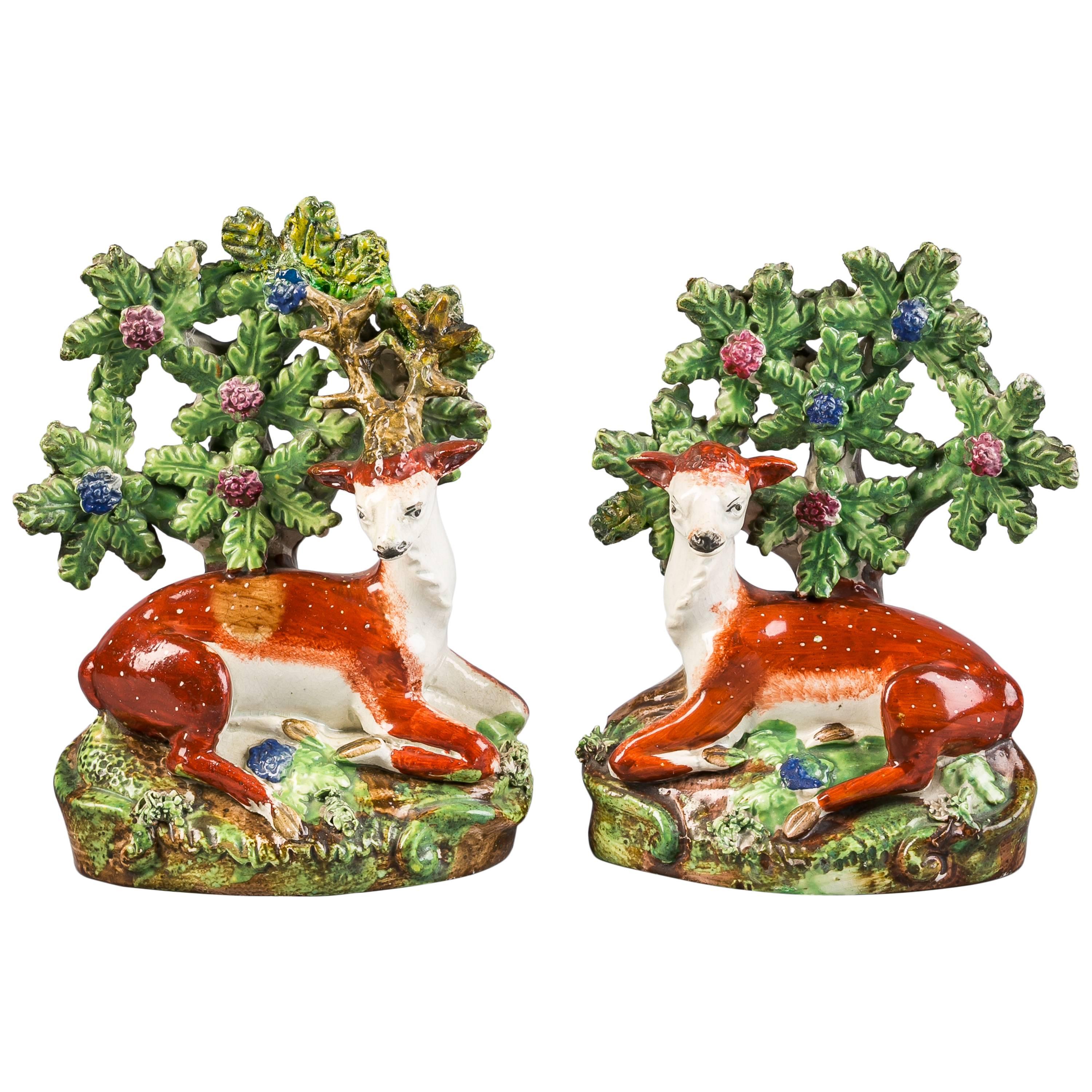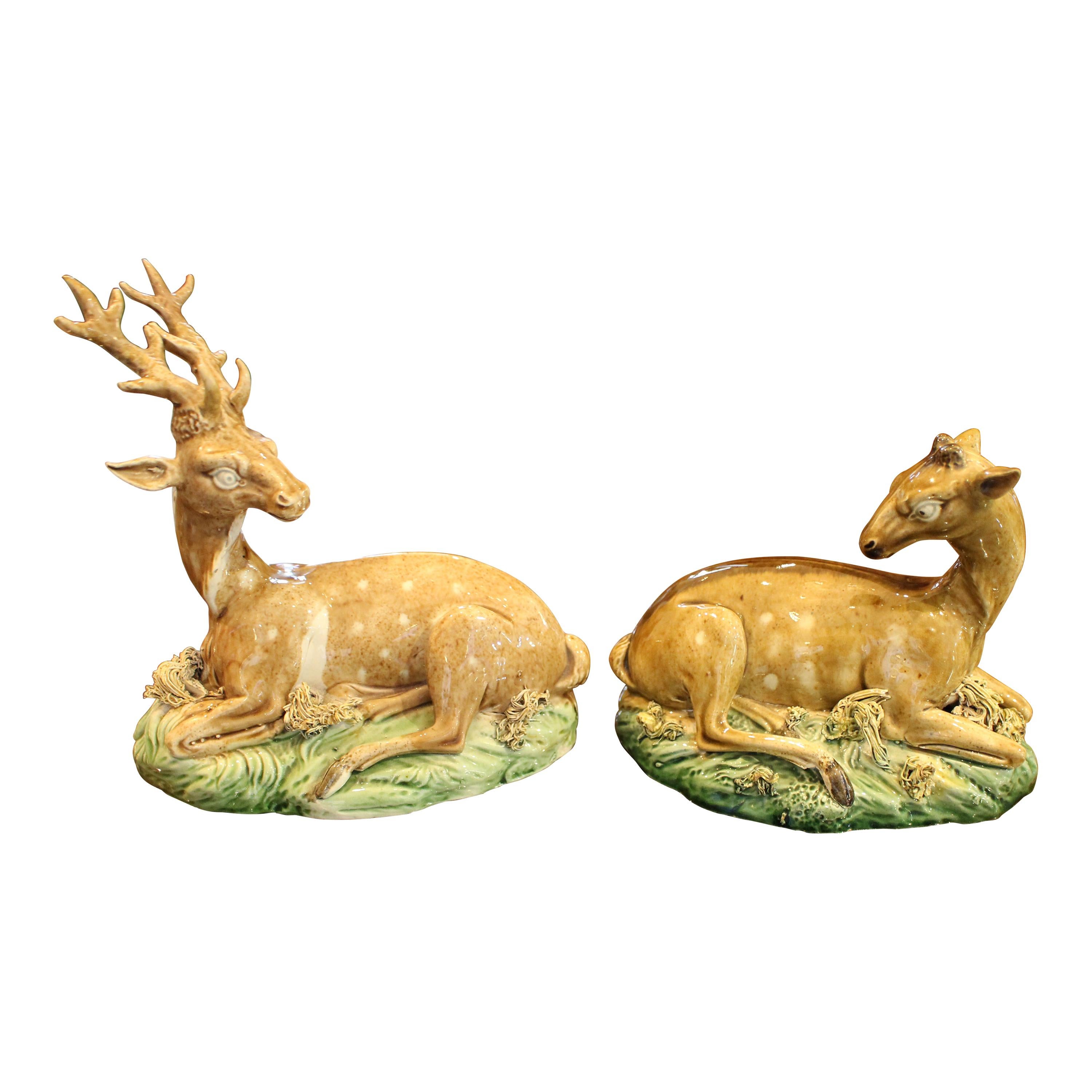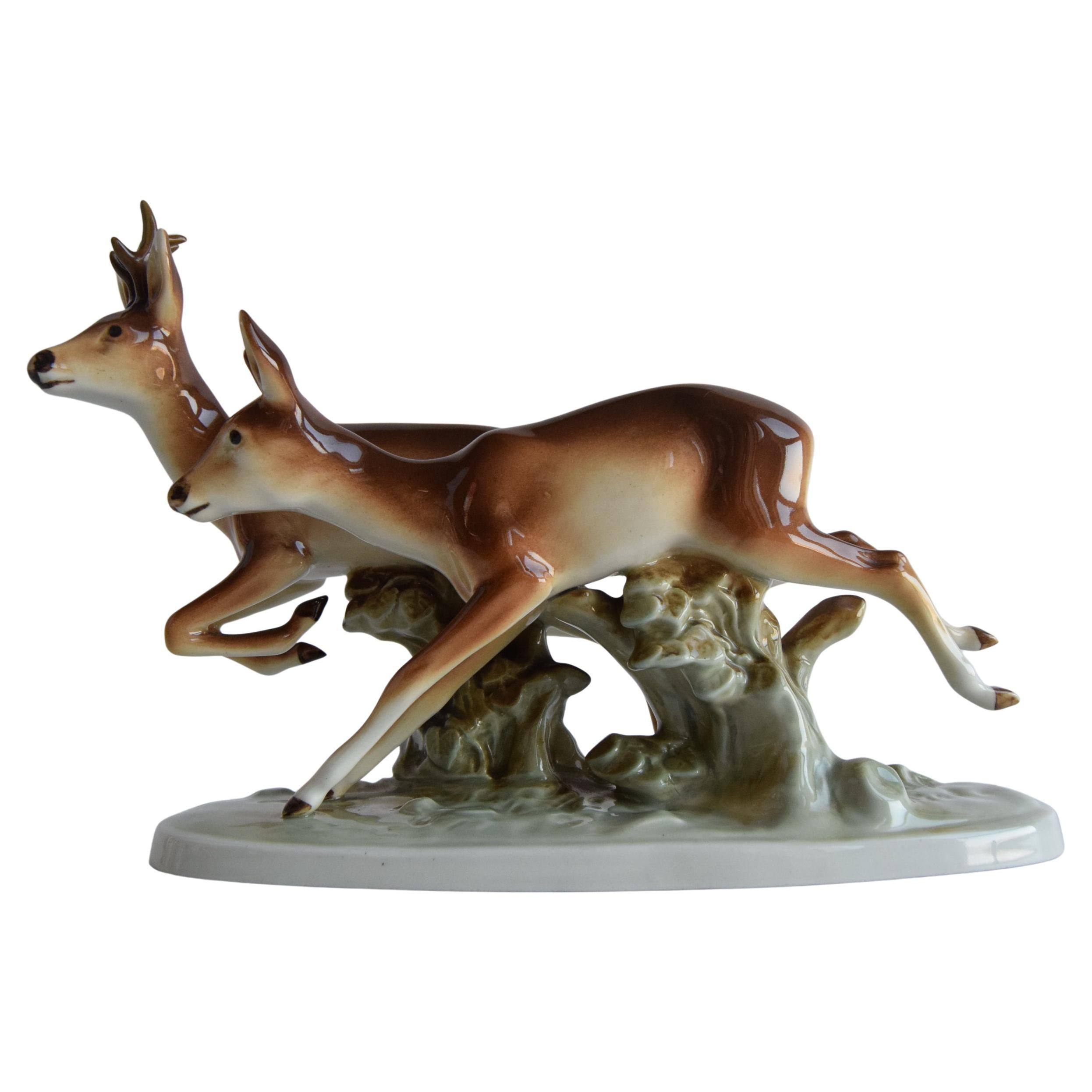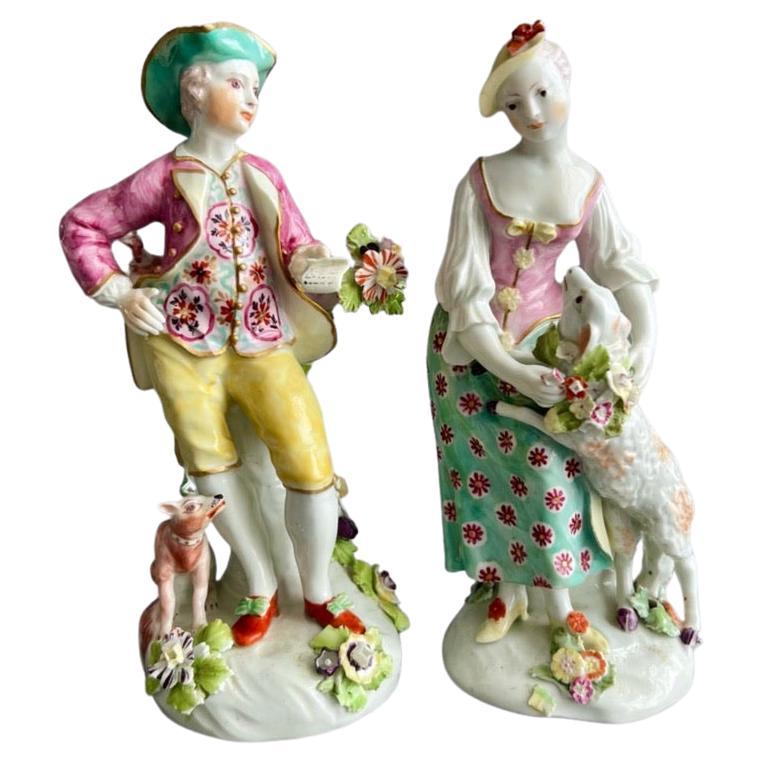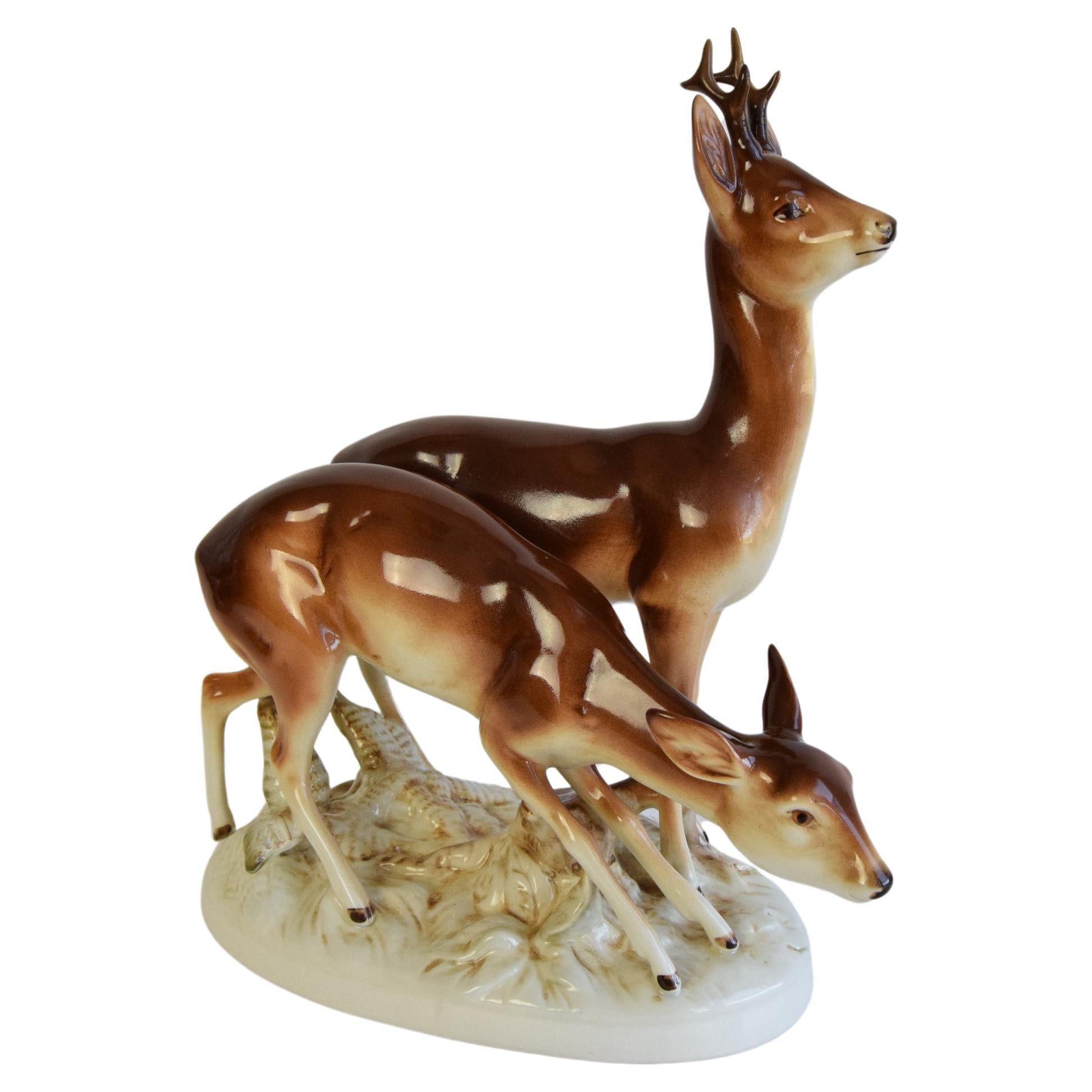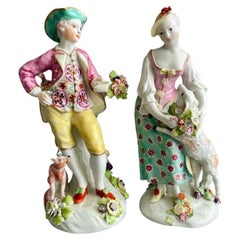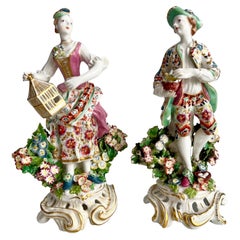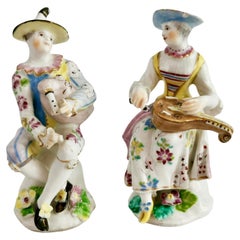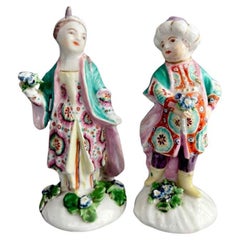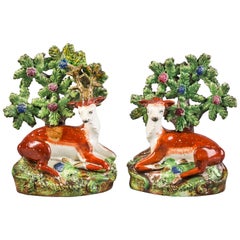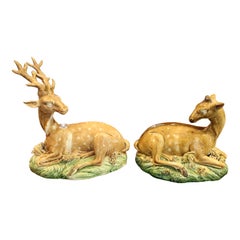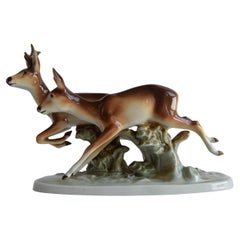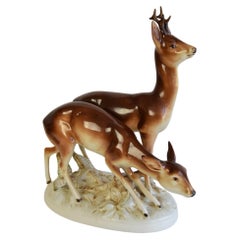Items Similar to Bloor Derby Pair of Porcelain Figures, Stag and Doe, circa 1765-1820
Want more images or videos?
Request additional images or videos from the seller
1 of 16
Bloor Derby Pair of Porcelain Figures, Stag and Doe, circa 1765-1820
$668per set
$835per set20% Off
£499.81per set
£624.76per set20% Off
€580.07per set
€725.09per set20% Off
CA$930.11per set
CA$1,162.63per set20% Off
A$1,046.16per set
A$1,307.71per set20% Off
CHF 542.62per set
CHF 678.28per set20% Off
MX$12,690.74per set
MX$15,863.43per set20% Off
NOK 6,880.14per set
NOK 8,600.17per set20% Off
SEK 6,474.59per set
SEK 8,093.24per set20% Off
DKK 4,327.49per set
DKK 5,409.36per set20% Off
Shipping
Retrieving quote...The 1stDibs Promise:
Authenticity Guarantee,
Money-Back Guarantee,
24-Hour Cancellation
About the Item
This is a very charming pair of porcelain figures of a stag and a doe, probably cast by Derby in about 1760 and decorated by Bloor Derby in 1820. The figures are a simple white porcelain with restrained gilt accents.
The Derby Porcelain factory has its roots in the late 1740s, when Andrew Planché, a Walloon Huguenot refugee, started making simple porcelain toys shaped like animals in his back yard. In 1756 Staffordshire enameller William Duysbury and banker John Heath started a new porcelain factory with Planché and this was to grow out to the largest factory of its time, buying up the bankrupted Chelsea and Bow factories, as well as the stock of several other workshops including that of James Giles. The combination of various traditions, porcelain making skills and sophisticated clients enabled Duesbury to create one of the best porcelain factories of the 18th and 19th Centuries, which after many ups and downs is still operative today.
In 1811 the factory came under the ownership of Robert Bloor, and this started the "Bloor Derby" era. The company was in financial trouble and Bloor had to find a way to turn it around. He found a huge stock of items that had been rejected over the years, but that were perfectly fine to decorate and sell. These figures were probably part of that hoard.
Derby made many animal figures in the 18th century, and the stags and does were popular in polychrome. This pair was decorated in simple white with gilt - very much in the neoclassical taste.
Figures like these were used to adorn the dinner table when dessert was served; groups of figures could serve to express something about the host, the guests, or to direct the conversation. Allegory was a popular pastime and every well-respected society figure was expected to be able to identify the seasons, trades, elements, senses or Greek and Roman gods and goddesses. Another popular topic was the pastoral life, so there are countless shepherds and shepherdesses with associated dogs, sheep and deer.
Neither of the items are marked, which is common for this period, they do have the numbers 2 and 3 inscribed, which are not shape numbers so it might have been batch numbers.
CONDITION REPORT: The stag has its antlers professionallyreplaced and it has some soot baked into the glaze, from production. The doe has her right leg replaced, some restoration to her ears, and has some overall crazing. Both have some light wear to the gilt and there are some tiny losses to the bocage. Other than this the figures are in very good condition and they look stunning. Please study the images carefully.
Antique British porcelain is never perfect. Kilns were fired on coal in the 1800s, and this meant that china from that period can have some firing specks from flying particles. British makers were also known for their experimentation, and sometimes this resulted in technically imperfect results. Due to the shrinkage in the kiln, items can have small firing lines or develop crazing over time, which should not be seen as damage but as an imperfection of the maker's recipes, probably unknown at the time of making. Items have often been used for many years and can have normal signs of wear, and gilt can have signs of slight disintegration even if never handled. I will reflect any damage, repairs, obvious stress marks, crazing or heavy wear in the item description but some minor scratches, nicks, stains and gilt disintegration can be normal for vintage items and need to be taken into account.
There is widespread confusion on the internet about the difference between chips and nicks, or hairlines and cracks. I will reflect any damage as truthfully as I can, i.e. a nick is a tiny bit of damage smaller than 1mm and a chip is something you can easily see with the eye; a glazing line is a break in the glazing only; hairline is extremely tight and/or superficial and not picked up by the finger; and a crack is obvious both to the eye and the finger.
DIMENSIONS: The stag is 9cm (3.5") long, 5cm (5") deep and 9cm (3.5") tall; the doe is slightly bigger than that. It is normal for figures of this era to be slightly different in size.
- Creator:Bloor Derby (Maker),Derby (Maker)
- Dimensions:Height: 1 in (2.54 cm)Diameter: 1 in (2.54 cm)
- Sold As:Set of 2
- Style:Rococo (Of the Period)
- Materials and Techniques:
- Place of Origin:
- Period:1760-1769
- Date of Manufacture:1765-1820
- Condition:Repaired: The stag has its antlers replaced, the doe has her right leg replaced, some touch ups to the doe's ears, some tiny losses to the bocage. Wear consistent with age and use. Minor losses. In excellent clean condition with minor restoration and losses.
- Seller Location:London, GB
- Reference Number:Seller: A-DER661stDibs: LU4805133354362
About the Seller
5.0
Gold Seller
Premium sellers maintaining a 4.3+ rating and 24-hour response times
Established in 2016
1stDibs seller since 2019
225 sales on 1stDibs
Typical response time: 2 hours
- ShippingRetrieving quote...Shipping from: London, United Kingdom
- Return Policy
Authenticity Guarantee
In the unlikely event there’s an issue with an item’s authenticity, contact us within 1 year for a full refund. DetailsMoney-Back Guarantee
If your item is not as described, is damaged in transit, or does not arrive, contact us within 7 days for a full refund. Details24-Hour Cancellation
You have a 24-hour grace period in which to reconsider your purchase, with no questions asked.Vetted Professional Sellers
Our world-class sellers must adhere to strict standards for service and quality, maintaining the integrity of our listings.Price-Match Guarantee
If you find that a seller listed the same item for a lower price elsewhere, we’ll match it.Trusted Global Delivery
Our best-in-class carrier network provides specialized shipping options worldwide, including custom delivery.More From This Seller
View AllDerby Exceptional Pair of Porcelain Figures of the Garland Shepherds, ca 1765
By Derby
Located in London, GB
This is a beautiful pair of Derby figures called the "Garland Shepherds", made in about 1765. The pair is one of Derby's most famous figure pairs and it bears the catalogue number E2...
Category
Antique 1760s English Rococo Figurative Sculptures
Materials
Porcelain
$1,160 Sale Price / set
20% Off
Free Shipping
Bow Pair of Porcelain Figures of Liberty & Matrimony, Rococo 1760-1764
By Bow Porcelain
Located in London, GB
This is a fabulous pair of figures of Liberty and Matrimony made by the Bow Porcelain factory between 1760 and 1764. These figures were a popular pair portraying marriage.
The bow...
Category
Antique 1760s English Rococo Figurative Sculptures
Materials
Porcelain
$2,960 Sale Price / set
20% Off
Free Shipping
Bow Pair of Porcelain Figures, Arlecchino and Columbina, Rococo ca 1758
By Bow Porcelain
Located in London, GB
This is a wonderful pair of figures of Arlecchino and Columbina, made by the Bow Porcelain factory in about 1758. These figures formed part of a series of the Commedia dell'Arte, a very popular series of theatrical figures that served as decoration at the dinner table in the 18th Century.
The Bow Porcelain Factory was one of the first potteries in Britain to make soft paste porcelain, and most probably the very first to use bone ash, which later got perfected by Josiah Spode to what is now the universally used "bone china". Bow was the main competitor of the Chelsea Porcelain Factory, but where Chelsea made very fine slipcast porcelain, Bow made a different soft paste porcelain that tended to be softer and could be pressed into moulds. Bow served a larger public generally at lower prices. The factory was only in operation between 1743 and 1774, after which the tradition got incorporated into some of the later famous potteries such as Worcester and Derby.
These figures were used to adorn the dinner table when dessert was served; groups of figures served to express something about the host, the guests, or to direct the conversation. The Italian Commedia Dell'Arte, a comical form of masked theatre, was very popular in those days and Bow copied many figures of the German Meissen series that were brought out in the decades before.
This pair dates from about 1758, which was at the height of Bow's ability to make beautiful figurines often copied from Chelsea or Meissen. The pair is modelled after a Meissen pair by Kaendler. The porcelain is translucent with a beautiful milky glaze - Bow was probably the first pottery using bone in its porcelain recipe. Arlecchino (Harlequin) is playing the bagpipes, dressed in an odd costume of mismatched chintz and playing cards and wearing a funny black trumpet...
Category
Antique 1750s English Rococo Figurative Sculptures
Materials
Porcelain
$2,880 Sale Price / set
20% Off
Free Shipping
Derby Pair of Porcelain Figures, "Boy and Girl in Turkish Costumes", ca 1770
By Derby
Located in London, GB
This is a rather rare pair of porcelain figures made by Derby around 1770. The pair was called the "Boy and Girl in Turkish Costumes", numbered 63 in Derby's factory list. They depic...
Category
Antique 1770s English Rococo Figurative Sculptures
Materials
Porcelain
$700 Sale Price / set
20% Off
Free Shipping
Bow Porcelain Figure of Juno with Eagle 'Jupiter', Rococo Ca 1765
By Bow Porcelain
Located in London, GB
This is a very rare and impressive large figure of Juno with an eagle, made by the Bow Porcelain factory in about 1765. This figure formed part of a series of the Four Elements, with...
Category
Antique 1760s English Rococo Figurative Sculptures
Materials
Porcelain
$2,400 Sale Price
20% Off
Free Shipping
Derby Porcelain Figure of Neptune and Dolphin on a Shell, ca 1785
By Derby
Located in London, GB
This is a stunning porcelain figure of Neptune with a dolphin standing on a sea shell, made by Derby around the year 1785. The figure is in beautiful original condition.
We have one other Neptune figure from 1765, please see separate listing.
The Derby Porcelain factory has its roots in the late 1740s, when Andrew Planché, a Walloon Huguenot refugee, started making simple porcelain toys shaped like animals in his back yard. In 1756 Staffordshire enameller...
Category
Antique 1780s English Rococo Figurative Sculptures
Materials
Porcelain
$1,680 Sale Price
20% Off
Free Shipping
You May Also Like
Pair of English Pearlware Deer, Staffordshire, circa 1820
Located in New York, NY
Pair of English pearlware deer, Staffordshire, circa 1820. Figures of a stag and a hind.
Category
Antique 1820s English Animal Sculptures
Pair of Staffordshire Pearlware Models of a Stag and Hind
Located in Palm Desert, CA
Pair of Staffordshire Pearlware models of a stag and hind, each spotted deer modeled recumbent on a grassy mound. From the collection of Peggy and David Rockefeller...
Category
Antique 18th Century British Pottery
Materials
Pottery
Vintage Porcelain Sculpture Roe Deer and Doe, by Royal Dux, 1960's.
By Royal Dux
Located in Praha, CZ
Made in Czechoslovakia
Re-polished
Beautiful decoration
Collector's item
Original condition
Category
Vintage 1960s Czech Mid-Century Modern Animal Sculptures
Materials
Porcelain
Porcelain Deer and Doe sculpture by Royal Dux, circa 1950's.
By Royal Dux
Located in Praha, CZ
Made in Czechoslovakia
Made of Porcelain
The roe deer has a chipped antler(see photo)
Original Vintage Condition
Category
Vintage 1950s Czech Mid-Century Modern Animal Sculptures
Materials
Porcelain
$429 Sale Price
20% Off
Pair of 18th Century Meissen Porcelain Groups in Dore Bronze Mounts, circa 1770
By Meissen Porcelain
Located in New York, NY
This pair of Meissen groups portray scenes of playful lovers in bowers of flowers embellished with mercury gilded bronze. The bowers are crowned with additional nosegays of porcelain...
Category
Antique Late 18th Century German Rococo Revival Sculptures
Materials
Meissen
Staffordshire Stag with Fawn Spill Vase England Circa 1860
By Staffordshire
Located in Katonah, NY
This large Staffordshire spill vase features a proud stag with a fawn standing on a shaped base.
The deer are painted in naturalistic orange/brown.
The upper edge of the tree trunk is gilded, and the white base has a fine gilt line.
The piece is decorated mainly on the front (see images).
Ref, 'Victorian Staffordshire Figures 1835-1875' Book 2, by A.& N. Harding, page 243, figure 2911/2912.
Dimensions: 11.75" tall x 7.25" long x 2.75" wide
Condition: Excellent, with very slight rubbing to the gilt on the top of the tree trunk.
Price: $320
Background of Staffordshire Deer...
Category
Antique Mid-19th Century English Country Animal Sculptures
Materials
Pottery
More Ways To Browse
18th Century Porcelain Figures
Antique Derby Porcelain
Porcelain Deer
White Porcelain Enamel Table
Staffordshire Enamel
China Porcelain Dogs
Bankers Table
Deer Legs
18th Century Bow Porcelain
Antique Chelsea Porcelain
Life Size Sheep
Pastoral Sculpture
Staffordshire Figures
Chelsea 18th Century
Antique Staffordshire Figures
Small Antlers
Shepherd Table
18th Century Chelsea Porcelain
